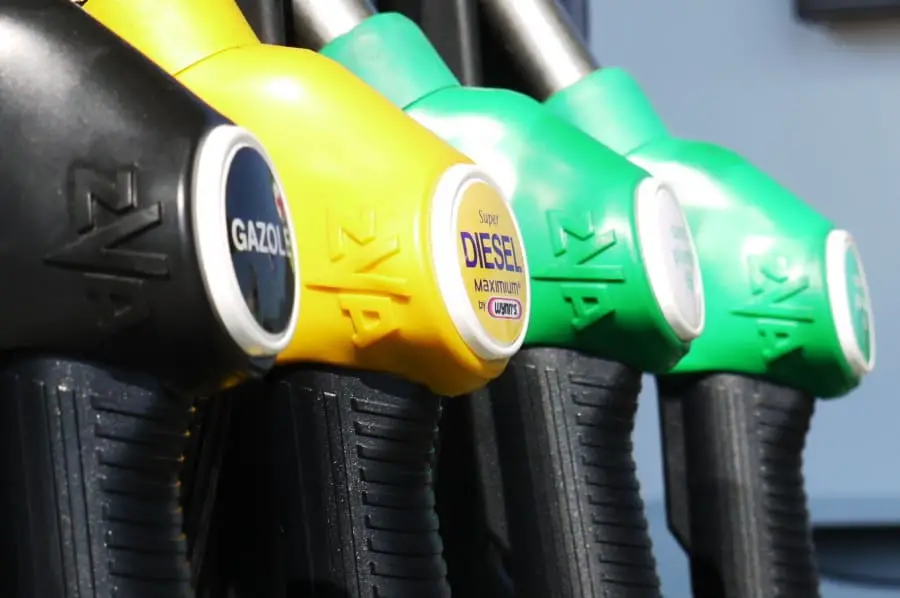Diesel fuel presents many advantages and perks over traditional gasoline. From its greater efficiency to its lower chemical reactivity, there are plenty of reasons to love diesel.
There are currently no major manufacturers making diesel push mowers in today’s market. These complex and long lasting engines usually aren’t made for homeowners. You will find most diesel push mowers and riders in commercial models.
Today we discuss whether lawn mower manufacturers have the same reverence towards this awesome fuel. We discuss the availability of diesel push mowers on the market today before we explore whether all lawn mowers can use diesel. Let’s get started.

Contents
Do They Make Diesel Push Mowers?
Is the scarcity of a diesel push mower because it is less effective or are there other causes? And can you go down to your local box store and pick one up?
Diesel lawn mowers are quite rare, especially in the private use market. This is because most domestic lawn mowers use smaller engines for tackling (typically) smaller areas. Diesel is largely reserved for big commercial riding lawn mowers (tractors and zero-turns) for a variety of reasons.
At the time of writing, there are no diesel push mowers produced by any major manufacturers.
Are Diesel Push Mowers Cost Effective To Make?
Quite simply, it is not cost-effective for manufacturers to make diesel push mowers.
Firstly, diesel engines are quite complex. Components like injectors are just some of the aspects that drive up the production cost for diesel. Interestingly enough, the bulkier size of diesel engines also makes them cheaper. Fitting diesel technology into a smaller package would be expensive and drive up the purchasing prices of would-be diesel push mowers.
Additionally, the presence of gasoline and electric power technology disincentivizes manufacturers from producing diesel mowers. Gasoline engines are much simpler (and cheaper) to produce in the compact format required by push mowers.
The same goes for electric motors, which are currently riding a wave of unprecedented innovation. The rate at which electric power technology is evolving is driving production costs lower than ever, so much so that many companies are basing their entire business models on the production of electric machines.
Great Reliability Keeps Diesel Mowers Off The Market?
Another reason behind the lack of diesel push mowers may be a bit controversial…but diesel’s reliability may also be why some manufacturers avoid making too many diesel products.
Diesel engines are notoriously die-hard. We all know somebody who has an old diesel truck that just keeps chugging along decades after the initial purchase. Mower owners would obviously love such longevity, but certain manufacturers aren’t on the same page.
You see, there is a business practice that is known as planned obsolescence, which involves making products that last long enough to at least reach the warranty, rather than products that last.
This naturally saves costs, but there is an even juicier catch: repurchases. The sooner a machine breaks, the sooner the owner needs a replacement.
Diesel engines are less likely to kick the bucket than gas engines of equivalent output, which is a potential wrench in planned obsolescence schemes. Private use mowers are rarely used more than once a week in peak season, so a diesel one would last forever.
If you would like to read some more great articles on mowers, see some of my others here…
- Honda Vs Briggs & Stratton Engine For Lawn Mowers?
- Is It Better To Push Or Pull A Lawn Mower? (Answered)
- How Long Do Riding Mowers Last? (Experts Explain)
Environmentalism And Diesel
Finally, there is a big issue that looks set to grow even bigger: environmentalism.
Diesel is notorious for its high emission levels, which makes its use in residential areas a bit of a challenge. Let’s not forget about the noise. Mowing at dawn with a diesel machine would be seriously problematic for neighbor relations.
State laws and homeowner association bylaws are getting more stringent, so the climate (pun intended) is no longer conducive for companies to try out a diesel push mower…that costs more to produce.
Therefore, from a cost perspective, it is not beneficial for companies to be taking on the challenge of building compact diesel engines, especially in a landscape with an increasing number of environmental laws. Gasoline and electricity are more than enough to cater to consumer needs and companies’ profit margins.
To Get A Diesel Mower- Buy Commercial Grade
Diesel engines are only profitable in the commercial space. Large 72+ inch zero-turns built to tackle large fields, resorts, campuses, etc. are better served with diesel motors because of their greater efficiency.
Fuel costs are a bigger concern for landscaping companies, which could require hundreds (or even thousands) of gallons per week. A private mower, in contrast, could need as little as a few ounces of fuel per mow.
Large diesel engines are cheaper to make in bulk, and the growth of landscaping as an industry is providing enough of a demand to keep production up.
In the long term, electricity may overtake diesel in the commercial arena but, for now, the restrictions of cords and batteries are still too cumbersome.
So, if you’re a fan of diesel engines, you should look for an agricultural or commercial riding mower.
Here are some great diesel lawn mowers on the market today:
- John Deere X750 Lawn Tractor
- Kubota ZD1500 Zero Turn
- Exmark Laser Z
- Hustler Super Z
- Toro 7500-D Series
- John Deere Z994r “ZTrak”
Can All Lawn Mowers Run On Diesel?
If diesel is such a powerful fuel and many commercial machines use it, then is it okay to simply put it in a regular gasoline engine? Can you put diesel in most lawn mowers?
All lawn mowers cannot run on diesel fuel. Mowers run on different power sources, so you must verify which one yours requires. The consequences of using diesel in a gas mower could range in severity, depending on the machine. The results range from not starting to complete engine failure.
If you are really lucky, the machine might not start. Usually, this problem can be resolved by draining all of the diesel from the machine’s fuel tank and putting in the correct fuel.
If you are unlucky, the machine may run, but in the gurgled and harsh-sounding manner that is commonly associated with engine wear. You might get away with this if you identify your error quickly enough. Continued operation can easily result in damage to moving parts like the piston, or even total engine failure.
In a case of severe damage and engine failure due to wrong fuel, your warranty will (usually) not cover you. Manufacturers will regard that as negligence and the warranty will be void.
So, be very careful.
For instance, you are unlikely to run into diesel-powered walk-behind (push or self-propelled) mowers. These kinds of mowers use gasoline, a gasoline-oil mix, or electricity. Electric mowers can either be corded or battery-powered.
As far as mainstream manufacturers, there are no diesel walk-behinds. However, you may encounter some third-party experiments and “prototypes” in some gearhead circles.
Diesel lawn tractors and zero-turns are much more common. Brands like John Deere, Exmark, and Toro have several machines that run on good old diesel fuel and the more modern bio-diesel.
The Final Touches On Available Diesel Walk Behind Push Mowers…
If you are a fan of a diesel engine and would like to have a diesel mower, you have two options…
- Buy a hardy but expensive commercial mower.
- Build your own porotype and enjoy the process.
Be warned. If you plan to build your own, you will inevitably run into the weight problem of most diesel engines. Though they can put out more power, they can sometimes be double to three times the weight of a gasoline engine.
The cost effectiveness of any production depends on demand and cost to manufacture. Most companies aren’t interested in producing a lower profit margin product that may last you your whole life.
I recommend some of my other articles here…
- Honda Vs Briggs & Stratton Engine For Lawn Mowers?
- Is It Better To Push Or Pull A Lawn Mower? (Answered)
- How Long Do Riding Mowers Last? (Experts Explain)
References
https://homeguides.sfgate.com/diesel-lawn-mowers-vs-gas-lawn-mowers-74564.html
